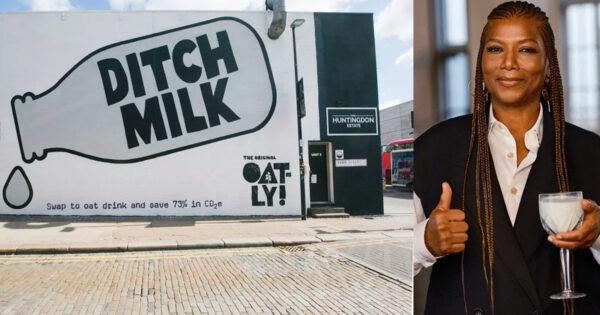
Regional outreach is part of Oatly’s efforts to reach beyond the coffee shops of Brooklyn and Los Angeles and into the homes of regular American dairy drinkers.
MilkPEP, the group behind the classic “Got Milk?” campaign, has responded to this rise of plant-based milk alternatives with pointed messaging wrapped in high production value and A-list talent.
The group released an ad early this year mocking nondairy milks with a parody about “wood milk” featuring White Lotus star Aubrey Plaza. An ad by CMPB also mocked milk alternatives through parody, listing absurd products like octopus or hot dog milk. More recently, MilkPEP dropped a spot starring Queen Latifah, formulated as a PSA calling out “milk shaming.”
“Our goal with our Queen Latifah spot was to shine a light on the absurdity of ‘milk shaming’ using humor while empowering milk drinkers (the majority of America) to feel proud,” said MilkPEP CEO and chief marketing officer Yin Woon Rani, adding that the dairy industry is making great progress on its climate footprint.
Oatly hasn’t shied away from the controversy that its ads generate. In Sweden, the “Ditch Milk” campaign became a nationwide debate, with politicians and pundits chiming in through op-eds and on talk shows.
“Any good effort to change the way things are done is going to provoke that tension,” Allen said, “making it a contest or conversation and not just a one-way communication.”
The power of behavior change
It’s important to note that fossil fuels, the main drivers of climate change, contribute the most to an individual’s carbon footprint. But food production also plays a role.
Climate solutions group Project Drawdown points to curbing food waste and switching to plant-based diets as the top two most impactful changes that households can make to curb their climate impact.
Because wealthy people in the U.S., U.K. and Europe are responsible for significantly more emissions on average than low-income people in the rest of the world, those people have the most impact through their transportation, food and fuel choices, according to a 2022 report from the United Nations’ panel on climate change.
Changing those consumption habits could save up to nine metric tons of CO2 equivalent emissions per person, per the report. If those changes happened at scale with the support of policy changes and efficient tech, emissions could be rapidly cut by at least 5%.




